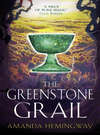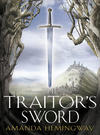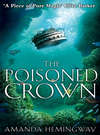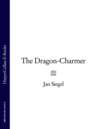Kitabı oku: «Prospero’s Children»

Voyager
PROSPERO’S CHILDREN
Jan Siegel

Contents
Title Page Prologue: The Mermaid Part One: The Key Chapter I Chapter II Chapter III Chapter IV Chapter V Chapter VI Part Two: The Door Chapter VII Chapter VIII Chapter IX Chapter X Chapter XI Chapter XII Epilogue: The Unicorn Glossary: Names Language Acknowledgements Praise About the Author Copyright About the Publisher
PROLOGUE
The Mermaid
The mermaid rose out of deep water into the stormheart. Being a creature with no soul, she was without fear of the elements which had engendered her. She rode the giant waves like a child on a switchback, sucked laughing into terrible black chasms of water, then hurled skywards towards the plunging clouds, riding the sea-crests with her hair lashing in the wind. Lightning illumined her for an instant, an efreet of the ocean, face a-scream with glee, slanting bones and elongated eyes sloping back from the pointed nose and tapering chin. It was a misshapen imitation of a human visage, formed perhaps by some pagan Creator who had caught only the briefest glimpse of Man. Her storm-tossed body was almost androgynous, flat-breasted, fish-pale, the ectopic nether limb glistening steel-silver with scales, each jagged fin shot with the needle-glint of poisonous spines. Above her, thunderhead clouds were piled into toppling cliffs of airborne water; the wind came roaring from the throat of the sky. More lightning-flashes, almost incessant now, picked her out in every motion of her wild play, leaping, diving, tumbling, amidst the heaving mountains and rocking valleys of the ocean. She could not remember another such storm, never in all her uncounted years on earth. Always alone, alienated both from Man and beast, a careless elemental for whom the waters were mother and lover, lifeblood and home.
She saw the barque ahead of her through a cleft between rearing waves, broken and desperate, clinging precariously to the skirts of the tempest. Drums rolled from the chasing clouds; storm-fires flashlit the ragged sail streaming like torn skin from a skeletal wreck of mast and spar. She was a small boat, sturdily built; the last remnants of her crew had secured themselves to tilting deck and sides with frayed rigging. Spume-capped ridges lifted her skyward, spun her round, then sent her plummeting nose-first into liquid ravines; but she was in her element even as the mermaid, and each time she would right herself and battle onward.
Strong arms gripped the useless wheel, not to steer but for an anchor against the greedy undertow that would have sucked the sailor from the deck. Lightning gleamed on a sea-glossed interplay of muscle in forearm and shoulder. The mermaid saw him as she drew astern, her hand on the gunwale, cold fingers touching the boat’s skin with the chill of the uttermost deep, weed-green hair crackling with secret electricity. He glanced round, some instinct warning him of the deadly gaze on his back. She saw the brine-blackened locks webbing his face, the narrowing of eyes both dark and bright. He saw he knew not what: a mirage of fear, a phantom of the storm, gone too swiftly for his mind to compass it, leaving only the impression of a wild white face and unhuman eyes depthless as glass. Yet moments later when his ears picked up the sound, a single distinctive note within the howling chorus of wave and tempest, he knew what it must be. He knew it in the marrow that froze in his bones and the hairs that stirred on his nape: a recognition beyond memory. It was a high thin keening—a call without words—a piercing thread of sound that sang even in the waves’ roaring. It swelled with the wind, until the fragile timbers of the boat shook with it, and he could imagine it penetrating even to the still deep places far below. One of the other sailors shouted a question but he shook his head and turned away. Still grasping the ruptured helm, he whispered to the boat a lover’s encouragement—his greatheart, his brave one, his dearling, his dear—though he knew it was all in vain. Behind him the siren-call had done its work: the hunt was up.
Orca and octopus, giant eel and electric serpent, countless sharks—sharks tiger-striped and leopard-spotted, ghost-pale and shadow-black—all gathered in their wake. In the coral-groves beneath, nameless creatures waited with glittering antennae and sharpened pincers, knowing it would not be long now. A mottled flank heaved out of the waves to starboard, many times the length of the boat; Crawling tentacles twined the boom, thick as a man’s arm: the water became opaque with a writhing flood of ink. And in the midst of the chase rode the mermaid, mounted on the back of an enormous shark—she whom the beasts of the sea had often hunted, never caught, now summoning them to her need with the feckless arrogance that was her most human characteristic. At the helm, the young man heard his companions’ cry of warning, but he did not look back again. The storm had ripped the shirt from his chest; salt clogged his lashes and stung his lips. The wind pricked his eyes into tears that evaporated on his cheek. Something which hung on a chain about his neck glinted against his breast with its own light, but the flicker of power was lost in the raging of the elements, helpless as a firefly in a hurricane.
The end came suddenly. A glassy cavern yawned behind the boat, rushing forward to swallow it; the sweep of a monstrous tail cracked the hull. The crew were borne away between tooth and tentacle, into the gullet of the sea. The young man found himself clutching a wheel without helm or vessel, see-sawing between peaks of water, holding on, not in hope or fear, but because survival is Man’s first and last instinct. Then he saw the face again, rising from the surge less than a yard away, its flat eyes aglow, its hair uncoiling like a nest of snakes in the wind. The pale lips were parted as if to suck his last breath. The fantasies of imminent death seized his mind, and the alien face became one more familiar, and the din of thunder was blotted out by the sea-surge in his head. He murmured something—a word, a name—and the mermaid, hearing, though she understood neither language nor affection, knew it was the name of his mortal love, whose spectre had driven her from his sight. Then she wound her arms around him, and drew him down and down into the deep.
* * *
In a murky grotto a few fathoms below she hid him, weighting his ragged clothes with rocks to keep him from drifting away. The tiny nibblers of the reef did not touch him for they were afraid of her: she would pull off their claws in hunger or caprice and suck the jelly from their transparent shells, or tear slender bodies apart with wanton fingers. Even the giant crayfish and monster crabs were wary of her, for she was a cunning huntress, thrusting a sliver of rock into the chink under horned carapace or between linked plates and using the makeshift tool to wrench them asunder. Too quick and too clever for the larger predators, she roamed her domain in fear of nothing, having not yet learnt the fear of Man which would soon infect all living creatures—Man her cousin and her kinsman, a killer more ruthless than the shark, deadlier than the kraken. She gazed on the sailor’s still face with a strange yearning, a tugging at her heart, or where her heart should have been, touching his cheek with her cold caresses, closing his eyes with shells, binding his hair with weed. Then she would grow irritated or bored with her dead plaything and swim away, forgetting him for an hour or a week, only to return and gaze on him again.
He was beyond the reach of the sun but the thing on his breast still gleamed erratically, sending glancing rays through the moving currents. Sometimes it seemed to grow hot, as if emitting pulses of fretful power: the water around it would hiss and shrink, forming bubbles full of steam which floated upwards in broken trails. When the mermaid tried to remove it her fingers prickled as if with pins and needles; once her whole hand grew numb. She left it alone, and as time passed it became dark and dull, and the face of the sailor was eaten away by creatures too microscopic to torment, and the sea washed his bones, leaving them moon-white among the hidden colours of the coral, and an anemone blossomed in one empty socket, and angelfish kissed his hollow cheek. Yet still she came back, once a month or once a year, as a miser returns to his hoard, and her gloating dwindled and her games, and she gazed long and long on the mystery of his death. She had never before been so close to a being which resembled herself, having no memory of parents, brother or sister, if indeed she had ever possessed any, born of the wind’s breath and the sea’s tears. Ever alone, for the first time in the aching shallows of her spirit she knew that she was lonely, and the seeds of her ultimate destruction were sown.
The Earth turned, season melted into season, the timeless morning of the world drew on to noon. The years were numbered, events arranged into history; the age of magic gave way to reason and science, knowledge and prejudice, religion and heresy. Men attempted to limn the continents with maps and web the seas with charts. A fisherman from a coastal village, more daring than his compeers, was casting his nets in unfamiliar waters when he hauled in a clotted mass that looked like weed. He bent over the side of the boat and plunged his hands in it to free it from the net, and it felt lithe as silk and curiously alive, writhing between his fingers. He pulled hard, sensing an alien weight below, and the weed parted beneath his hands even as the head emerged from the water. A terrible head with the blanched clammy complexion of the drowned, bloodless mouth agape, glaring eyes above slanting bones. But the head lived. The eyes flashed like the glint of light on broken glass and an eldritch wail came from between the pallid lips, rising in pitch and slowly strengthening, vibrating from the long throat as from a living flute. The fisherman knew that call from race memory or traveller’s tale, and he dragged the head close to the ship’s side and laid the naked blade of his gutting knife against her neck, ordering silence in a tone that transcended the barriers of language. Her mouth shut tight and he called to his sons to help him heave her on board, staring in wonder as the water ran from the unnatural tail squirming against the bonds of the net. One of the boys received a handful of spines in the struggle, and in the night he sickened and lay in the cabin burning with fever, but the fisherman would not throw the mermaid back. He poured water over her to keep her moist and fed her raw fish from their catch, drawing near to press his knife into her flesh even while her live hair coiled about his ankles.
Whether this was the same mermaid or another no legend tells: certainly this one understood something of mortal speech, or learnt understanding in the extremity of her need. She was alone as always, divided by a few flimsy planks from the sea that was her element, prisoner of her enemy, her only real predator, her kin. Perhaps she had sought that capture, driven by centuries of isolation or a fatal curiosity; but here was no storm-tossed seafarer, his hard beauty softened by the phantom of love, here was only a weather-weary peasant, toughened by the long slow battle for survival, and in his face the blending of fear and anger, and a deadly greed.
After two days in a babbling delirium the boy died, and in the morning the fisherman went to his captive with a raw heart and new-sharpened knife, grasping her green hair and dragging her head back for the death-blow. Her angled eyes stared into his, impenetrable as the eyes of an animal, and he could not tell if there was terror behind them, or intelligence, or deceit. And then for the first time in memory or legend she spoke, and her voice throbbed harshly from unused vocal chords; but there was an echo in it of the wind, and an echo of the sea. ‘Don’t,’ she said. ‘Don’t kill.’ She could not say please because the word was beyond her understanding.
‘My son is dead,’ said the fisherman. ‘A death for a death. You should have found your voice the sooner. It is too late now to beg.’
‘Your son was careless. He died easy. If not now, then later. Is no loss.’
‘I loved him,’ said the fisherman, and his hand tightened on her twisting hair and the knife gleamed before her.
‘You have other sons. What is love?’
The fisherman knew few words for the gentler emotions. ‘He sprang from my loins,’ he responded at last. ‘Flesh of my flesh, bone of my bone. You could offer me the treasures of a dozen shipwrecks, the pearls from a hundred oysters, but it would not buy your life. That is love.’ The blade sank into her flesh until a thin trickle ran down her white skin, and he saw with something close to desire that her blood was as red as his.
‘I have not found love,’ said the mermaid, and her voice was as thin as the wind hissing through a chink in a wall of ice. ‘There is none in the deep sea. But I have treasure. I have a great treasure.’
The knife was withdrawn an inch or two; the fisherman’s tone changed very slightly. ‘What treasure?’
‘From a ship,’ said the mermaid. ‘A ship that sank long ago. The treasure lies in the coral. Even the bones are coral now.’
‘What kind of treasure?’ the fisherman reiterated, and there was no mistaking the eager glint in his eye. ‘Gold?’
‘It glittered,’ said the mermaid. ‘In the dark beyond the sun it gleamed like the storm-fire. It is my treasure, my secret.’
‘I will trade you this treasure,’ said the fisherman, ‘for your life. My son is gone and neither love nor gold can bring him back. But I will take your treasure as blood money, the price of my revenge.’
At that his two remaining sons cried out against him, for their brother had been very dear to them, and they found the mermaid both alien and unchancy, too wayward to trust, too perilous to spare. No oath would bind her to her bargain: principle and mercy alike were outside her comprehension. ‘Release her,’ they said, ‘and she will swim fast and far, and we will have neither vengeance nor payment. We want blood for our brother.’
‘Gold is better than blood,’ said the fisherman, and they were silenced. Then he cut a single tress from the mermaid’s hair and knotted it, though it seemed to resist him, the separate strands seeking to slip away between his fingers. ‘I will let you go,’ he told her, ‘and for three days I will keep this lock of hair in a jar of water. But if in that time you do not return—if you try to cheat me—if you do not bring me the treasure, then I will pin the lock to the mast and let it dry in the wind, and if you never come at all then when I am back on shore I will lay it out in the noonday heat until it shrivels away, and even in the ocean’s depths you too will shrivel, burned by a sun you cannot see. Do you understand?’
‘I understand,’ said the mermaid.
‘Go then.’
He snapped the rope that held her and she pulled herself over the side, diving like a flying fish in an arc of silver, lost in an instant beneath hurrying waves. ‘You will not see her again,’ said the boys.
But the fisherman clasped the lock of hair and smiled a smile without humour, confident and grim.
‘I will see her,’ he said.
On the afternoon of the third day the mermaid returned. The fisherman had lingered in the area against the wishes of his sons, although the body of the youngest was starting to putrefy and the sweet smell of death had begun to permeate the whole boat. By day they fished, but the nets which had been replete now came up empty: only a sprat or two twitched on the brine-washed deck among a few knots of weed, and some strange creatures which resembled living fungi and leaked a noxious ooze at the pressure of a finger. The wind had dropped; the sails hung limp as the drapes on a tomb; thin tides of cloud had seeped across the sky, blearing the face of the sun. Late that day the last rays, issuing from beneath the cloudline, filled the narrow space between sky and sea with a concentrated brilliance. The clouds were burnt bronze, the air turned to gold, glancing fires sparked from every wave. The mermaid rose from a pool of dazzle, dark against the brightness, her long hair netting the sea-fire. She swam warily to the side of the boat, staying out of reach of both the fisherman and his knife. Her hands were hidden under the gilded water; her face was as expressionless as that of an animal.
‘Where is it?’ he demanded. ‘Where is my treasure?’
‘I have it,’ she said. ‘Where is my hair?’
One of his sons brought him the jar; he lifted the contents out and held them up for her to see. The single tress still twitched and twisted like the newly-severed tail of a live serpent.
‘My treasure?’ he repeated.
Her hand emerged from the water; she stretched out her arm. The fisherman closed hungry fingers on a hard irregular shape, lumpy with tiny polyps, slimy with tendrils of weed. The touch of the mermaid’s skin was colder than the coldest fish. In the same instant one of his sons, bitter beyond any gold-lust at his brother’s death, started forward to seize her, knife at the ready. But she was too sudden and too slippery for him: she had broken free even before he tightened his grasp, before his father’s shout, before the knife had done its work. She was gone in a swirl of fractured sunlight, leaving only a wisp of blood—too little blood—uncurling beneath the bright reflections. The fisherman still clasped her violated hair. In the silence that followed he looked down at the object in his other hand, the small, jagged thing, coral-studded, begreened with weed: the treasure. It took him a minute or two to realise what it was. A key.
The fisherman was seized with a fury far greater than the anger he had known for the loss of his son, the pent-up fury of his toil-filled, empty-bellied, mean-hearted life, the fury of a dream shattered, of greed cheated, of hope extinguished forever. It distorted his mouth and dragged his features this way and that, it mounted in him like a tidal wave, it howled through him like a storm. His sons shrank from it; the very boards of the ship seemed to quiver in fear. Yet after the first terrible curse he grew quiet again; poverty had taught him the hardest lessons in self-control. ‘A key!’ he said. ‘A key. And no doubt the lock that it should fit is fathoms deep, in a treasure chest accessible only to the crabs. God damn the lying nixie! May she writhe in a waterless hell for all eternity!’ So saying, he went to hurl away his useless prize. Then, with an abrupt change of mind, he thrust it into a deep pocket and descended into the cabin, the fury set like stone in his face. When he returned he was carrying a tinder-box. He struck a light and held the tress of hair above it. The strands parted, billowing, fanning away as though trying to escape the lethal fire. Then he lowered the hair onto the flame and slowly, smiling, he watched it burn.
Deep below the surface the mermaid felt herself scorched with a sudden, impossible pain. Heat flared on her cold skin, bubbling it into blisters, searing into her flesh. Her bright tail blotched and blackened, moulting poisonous spines that charred even as they fell. Water surrounded her, yet she burned. Her body arched and buckled, struggling to be free of the agony that invaded it. The last clear note of her clouding mind was one of utter incomprehension. Then the sea fizzed around her as her very substance withered, melted, and was dispersed, minute grains swept away on the many currents of ocean, feeding the unseen creatures who are the seeds of all life.





